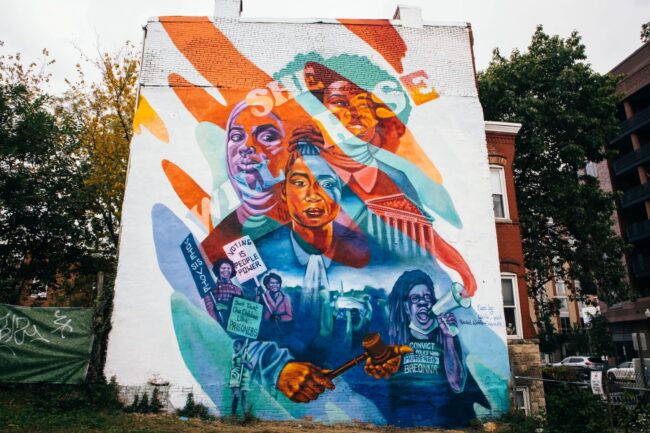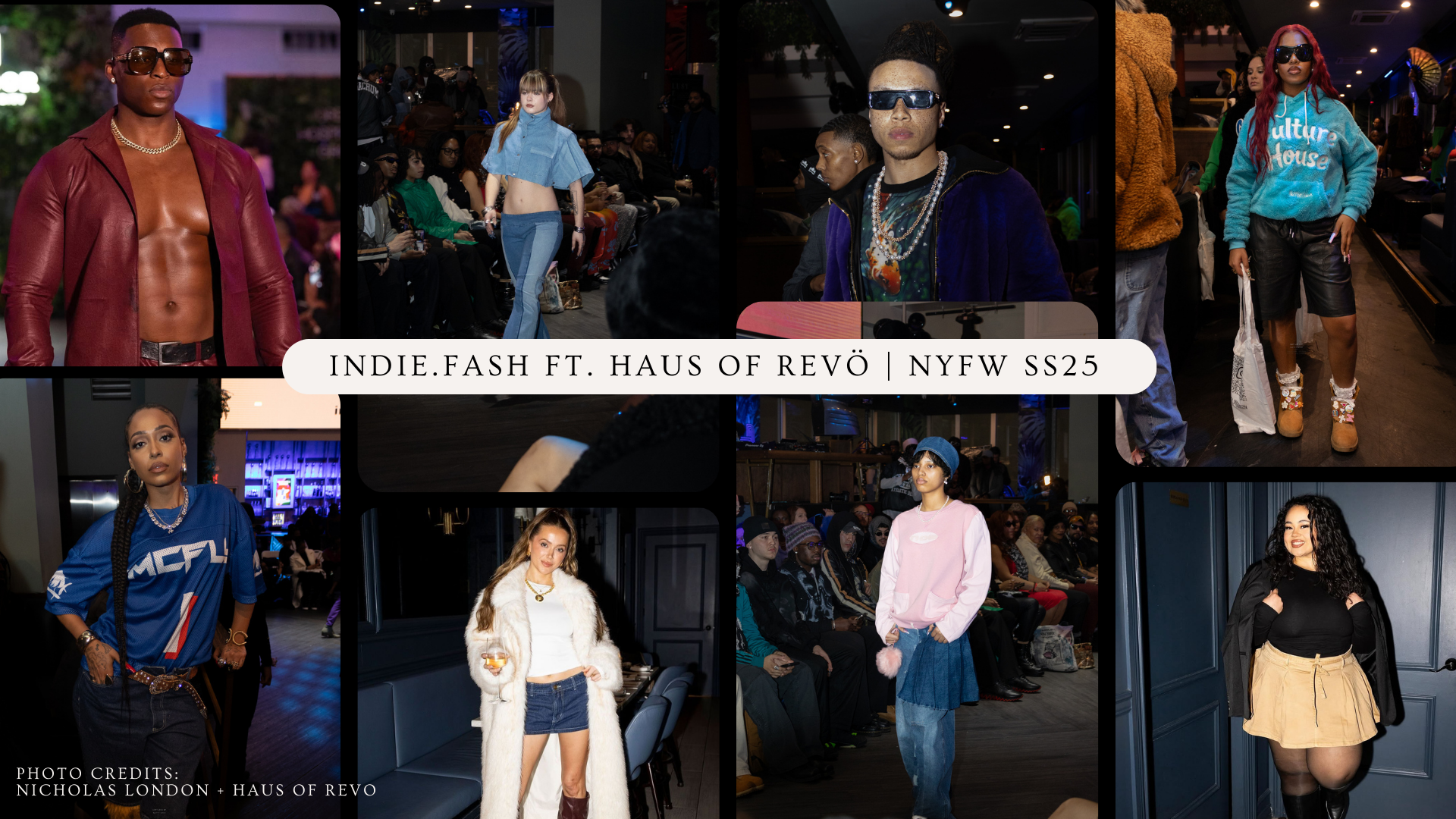
Highlighting Women of the DMV for Women’s History Month series: Introducing Kim Tignor
What’s the first thing you think about when I say Intellectual Property? Still, have no clue? Intellectual Property is defined as “a work or invention that is the result of creativity, such as a manuscript or a design, to which one has rights and for which one may apply for a patent, copyright, trademark, etc”. Intellectual property rights are the rights given to persons over the creations of their minds. Far too often individuals are not familiar with their rights and this is how marginalized communities get targeted. Because of this very reason people need platforms and leaders that can help our communities. Look no further than Kim Tignor who is the creator and founder of Take Creative Control (TCC) and executive director of the Institute for Intellectual Property & Social Justice (IIPSJ).
As we continue to shine a spotlight on the women in the DMV for women’s history month I had the pleasure of interviewing Kim Tignor! We talked about everything from intellectual property, the first black woman being appointed to the Supreme Court, and the #SheWillRise campaign.
Q: First off thank you for taking the time to answer some questions with us! To start as an advocate for mental health I always ask my guest how are you doing? How has your 2021 been so far?
Kim Tignor: 2021 is going really well and it’s still really tough. You know I almost feel like that’s just what adulting is these days, it’s really great days with some really tough moments. I definitely feel blessed, but we’re all fighting to survive. It’s real. I feel very blessed and very fortunate and grateful. It’s hard. These are not easy times.
Q: For the people unfamiliar with you and your work, could you tell us a little about yourself? Where were you born and raised?
Kim Tignor: I’m born and raised Washingtonian. I’m from DC! I went away for undergrad at William & Mary but then I came back for law school and I’ve been trying to figure out ways to serve my community with all of the things I have learned ever since!
Q: How was going away for undergrad? Did you always know you would return to the city?
Kim Tignor: I have a very deep love for Washington. It’s just deep. It’s a magical city. The black community is just so dynamic and smart and multifaceted. I’ve always had a lot of love for the city! I never felt a duty to serve DC or come back but more of a privilege. It’s in my DNA. It’s in my personal constitution. I love my people and the city. My dad has always been big on service and I just knew I was going to return and figure out how to serve my city and ensure that my community and people were left better off as a result of my contribution being as small as it is, I was always going to do my best to try to leave things a little better than how I found them.
Q: I know that you are one of the co-creators of the #SheWillRise campaign. How did the campaign start?
Kim Tignor: In my organization, prior to the institute I did a lot of work in civil rights spaces and as it turned out I did a lot of work on judicial nominations and really looking at how the federal judiciary impacts communities of color, and through my work, at the IIPSJ and my work with “Take Creative Control” (TCC) we have developed a sensational network of creators of color and what I wanted to do is to start connecting those creative entrepreneurs very intentionally to the social justice movement.
So with #SheWillRise first we built the brain trust, which are four phenomenal black women who are the counsel! We also only work with black women vendors. From there we partnered with Rachel Wolfe who did the SheWillRise mural over on 9th street. We also did a picture of one hundred little girls between the ages of two and seventeen all dressed up as Supreme Court Justices. We wanted to really connect the idea of art as activism along with leveraging our creative talents to move social justice issues.


There are going to be times when you will walk into a room and you will get the signal that if you dim your light just a bit that you may make folks just a little more comfortable, and you just have to fight that urge and fight that instinct. Under no circumstance dim your light. Whenever that moment comes, instead shine your light brighter!
Q: Black women for years have been on the front line for protest, voting polls, and in the community. Why do you believe it has taken as long as it has for a black woman to be appointed to the Supreme Court?
Kim Tignor: Because the intersection of racism and sexism hits the hardest. Kim Crenshaw who is my personal hero talks about the unique way in which both being a woman and being black it manifests the layering of those two things creates an entire beast in itself in that we have to navigate. I think it’s also so many rooms we’ve been locked out of that has impeded our pipelines. The Supreme Court is a long game.
If we are not thinking about and constantly cultivating that pipeline to the court and waiting as black women for a vacancy on the Supreme Court then we’re starting the conversation entirely too late. It’s a conversation we need to be having day after day after day so that when that opening happens we have our line of amazing black women standing there waiting to say take this woman and this woman!
Q: As “Take Creative Control” helps creators know their rights and how to exercise them. I know that TCC host events to educates individuals on IP covering copyright, fair use, patents, trademarks, etc. Are there any plans once the pandemic is over to host more events in the future?
Kim Tignor: Absolutely! We are hoping to be able to do some things in person before the end of the year. Let me let the lord know what I want, I gotta put it out into the universe haha! I will say that even in this virtual world we have started doing “Take Creative Control” the series, where we’ve been lifting up stories of creators of color and how they’ve been navigating the pandemic. From what their pandemic pivots have looked like, what does success look like in a virtual world, what are the challenges and problems that are unique to marginalized communities that they have to navigate to be able to share their creative works? Even in this pandemic, it has been a beautiful thing to see how people have figured out different ways to connect with their communities.
Also, we are doing Smaller Creative Control where it’s virtual roundtables and we do it based on their industry! We have one coming up for self-published authors and was inspired by Jason Primrose who’s one of our featured creative entrepreneurs in our series. The series will pair them with a firm, help them navigate different platforms, bringing in different tech companies to give them advice on google ads and all the craziness that one usually has to figure out on their own when you’re trying to monetize and share your creative works.
Q: As an initiative that supports the CASE ACT. Can you tell people why the CASE ACT which was recently passed is so important?
Kim Tignor: If you think about your creative toolset and being able to protect your work, this is congress literally putting a big sledgehammer in your toolset, because what it does is put the power in your hands being able to take on litigation and protect your work. So if someone is infringing on your copyright and in the past, you would retain a lawyer which would set you back between ten to fifteen thousand dollars to pursue that infringement, and these larger companies know this so what is the disincentive for them to infringe on your content? They know you can’t afford to come after them and even if you did you wouldn’t know what to do and they have more money to throw at the situation than you do.
So what the CASE ACT has done is allowed you as a creator on your own to represent yourself in a court, gather up the information and literally put the power in the people’s hands and kind of democratizing the entire process. It lowers the threshold for who gets to say “You are stealing or infringing on my rights”.
Q: As we focus on women’s history month who are some of the women that inspired you in your journey?
Kim Tignor: Oh wow! Stacy Abrams, My mom, my grandmother, Lita Rosario who is an amazing attorney here in the city, and Amanda Gorman. If you wanna talk about the power of the creator and activism take a look at Amanda Gorman. Those are my top favorites right now.
Q: What does women’s history month mean to you?
Kim Tignor: We should honor women every day for 365 days a year and honor black people 365 days a year and not just be limited to a month. Why not reserve a time to make sure that we honor and remember the really important contributions of women in history and at present! It’s just taking a moment to bring a little intention to how we honor women and their contributions.
Q: For the women and little girls out there who look up to you and want to follow in your footsteps, what is some advice you could offer them?
Kim Tignor: I would tell them that the further you lean into your passions and who you are the easier it is for your passions and for those who are looking for you and need you to find you. And also fight any urge to dim your light. There are going to be times when you will walk into a room and you will get the signal that if you dim your light just a bit that you may make folks just a little more comfortable, and you just have to fight that urge and fight that instinct. Under no circumstance dim your light. Whenever that moment comes, instead shine your light brighter!
Q: What can the people expect next from Kim Tignor?
Kim Tignor: We are just going to keep on building Take Creative Control (TCC). We’re going to be in more cities as soon as we come back from the pandemic. We’re positioning to be doing some work strictly focused on women creative entrepreneurs and creating space where women can show up and be able to get everything handled from A to Z as far as thinking about the business side of your creative expression. Along with more from the Take Creative Control series as we have received more funding so be on the lookout for that.
Q: Lastly if you could use three words or less to describe how you want 2021 to be for you, what would those words or word be?
Kim Tignor: Prosperity, Patience, and Restorative.
Q: Thank you so much for taking the time Kim we really appreciate it!
Kim Tignor: Absolutely thank you for having me. Take Care!
To keep up with everything Kim Tignor is doing please follow her socials and the following organizations.
Take Creative Control Instagram
Institute For Intellectual Property & Social Justice
Institute For Intellectual Property & Social Justice Instagram
Institute For Intellectual Property & Social Justice Twitter











